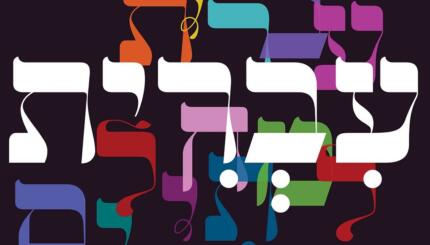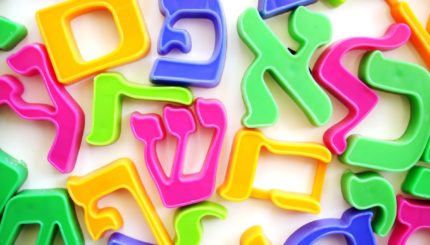The range of pre-modern, secular Hebrew literature is limited. From the late biblical period on, Hebrew was not a spoken language, and it was used primarily in religious contexts. An exception to this rule was the Hebrew literature that flourished in Spain, Provence, and Italy between the 10th and 14th centuries. Poets such as Samuel HaNagid, Judah HaLevi, and Immanuel of Rome wrote secular verse in addition to their many religious and liturgical poems. Prose fiction was much less common, though Abraham ben Samuel ha-Levi ibn Hasdai’s Ben ha-Melek ve-ha-Nazir–a work based on an Arabic version of a classic Indian story about the life of Buddha–is one interesting example.
Modern Hebrew literature–though mostly didactic in nature–began appearing in the late 18th century, in journals affiliated with the Haskalah or Jewish enlightenment. However, in places where the Haskalah was most “successful”–like Germany–assimilation was rampant, and Hebrew writing virtually disappeared. Indeed, the only people suited to develop Hebrew literature were those who had learned the language through traditional Torah study, men who had spent time inyeshivot or seminaries. These figures were overwhelmingly situated in Eastern Europe, and thus, modern Hebrew literature was born in cities like Vilna, Warsaw, and Odessa.
From the beginning, the prospects for modern Hebrew literature–particularly prose–were bleak. Could a non-spoken language reflect communal experiences? There were logistical problems as well. The first writers of modern Hebrew literature primarily used biblical Hebrew, but biblical Hebrew was not suited to modern literary needs. Its vocabulary was archaic and its syntax clumsy. Shalom Yakov Abramowitz–better known by the name of his famous protagonist Mendele Mokher Seforim (Mendele the Book Seller)–took monumental steps in trying to solve these problems. Instead of restricting himself to biblical Hebrew, Seforim relied heavily on the Hebrew of rabbinic literature, particularly the Mishnah(redacted c. 200 CE). Rabbinic literature discusses the minutiae of everyday life, and thus it provided him with an extensive lexicon.
The end of the 19th century saw the emergence of the first masters of Hebrew literature: Seforim, Yoseph Hayim Brenner, the poets Hayim Nahman Bialik and Saul Tchernichovsky, the more experimental writer Uri Nissan Gnessin, and the fantastical Shmuel Yosef Agnon. At the same time, Zionism was advancing its dream of a new Hebrew culture in Palestine with thedeveloping modern Hebrew language at its core, and these writers received encouragement and inspiration from this movement.

Help us keep Jewish knowledge accessible to millions of people around the world.
Your donation to My Jewish Learning fuels endless journeys of Jewish discovery. With your help, My Jewish Learning can continue to provide nonstop opportunities for learning, connection and growth.
The first wave of Hebrew literature written in Palestine was heavily Zionistic. The poets of this time, such as Shlonsky, Lamdan, and U.Z. Greenberg, wrote about the Jewish pioneers and their relationship to the land of Israel. This ideological writing continued into the early years of the State. Novelists such as Shamir wrote realist fiction about the struggles and triumphs of the Sabra, the new Jew.
 The so-called New Wave of Israeli fiction began in the late 1950s. Writers such as Amos Oz, A.B. Yehoshua, and
Appelfeld, drifted from the realist, Zionist tradition of early Israeli literature. They were heavily influenced by the surrealism of writers like Agnon and Franz Kafka. They also began to question many of the nationalistic leanings of the Generation of 1948, as the earlier writers were known (1948 being the year of Israeli independence). Tired from the War of Independence, the Sinai campaign, and ultimately the wars of 1967 and 1973, they voiced their concerns about Zionism and Israel’s attitude toward its Arab neighbors.
The so-called New Wave of Israeli fiction began in the late 1950s. Writers such as Amos Oz, A.B. Yehoshua, and
Appelfeld, drifted from the realist, Zionist tradition of early Israeli literature. They were heavily influenced by the surrealism of writers like Agnon and Franz Kafka. They also began to question many of the nationalistic leanings of the Generation of 1948, as the earlier writers were known (1948 being the year of Israeli independence). Tired from the War of Independence, the Sinai campaign, and ultimately the wars of 1967 and 1973, they voiced their concerns about Zionism and Israel’s attitude toward its Arab neighbors.
Hebrew literature has continued to build upon surrealist and experimental trends. David Grossman’s See Under: Love (1986) is perhaps the greatest Israeli novel to be written in recent decades. Grossman’s novel is made up of four long chapters, each written in a different style. Though Amalia Kahana-Carmon was one of the most important writers of the New Wave, fiction by Israeli women truly flourished in 1980s and 1990s with writers such as Yehudit Katzir and Orly Castel-Bloom. Israeli literature has also taken a multicultural turn of late. Key to the Garden: New Israeli Writing, a volume edited by Ammiel Alcalay and published in 1996, brings together literature written by Israelis from Levant, Iran, India, and the Arab world.



